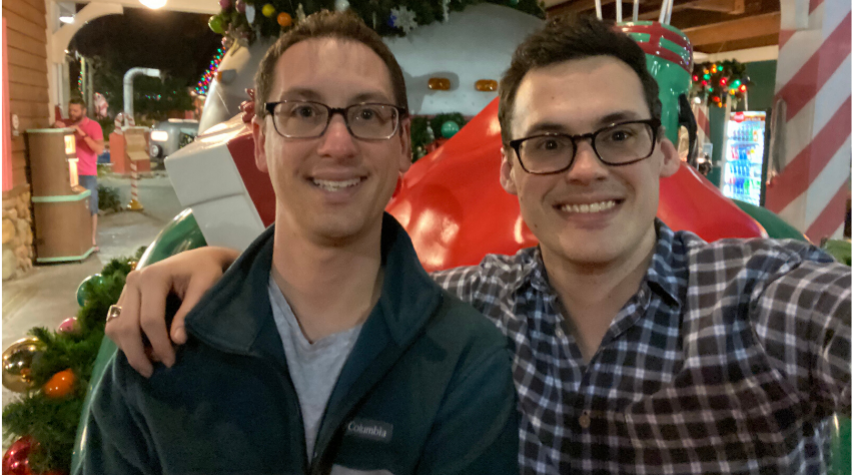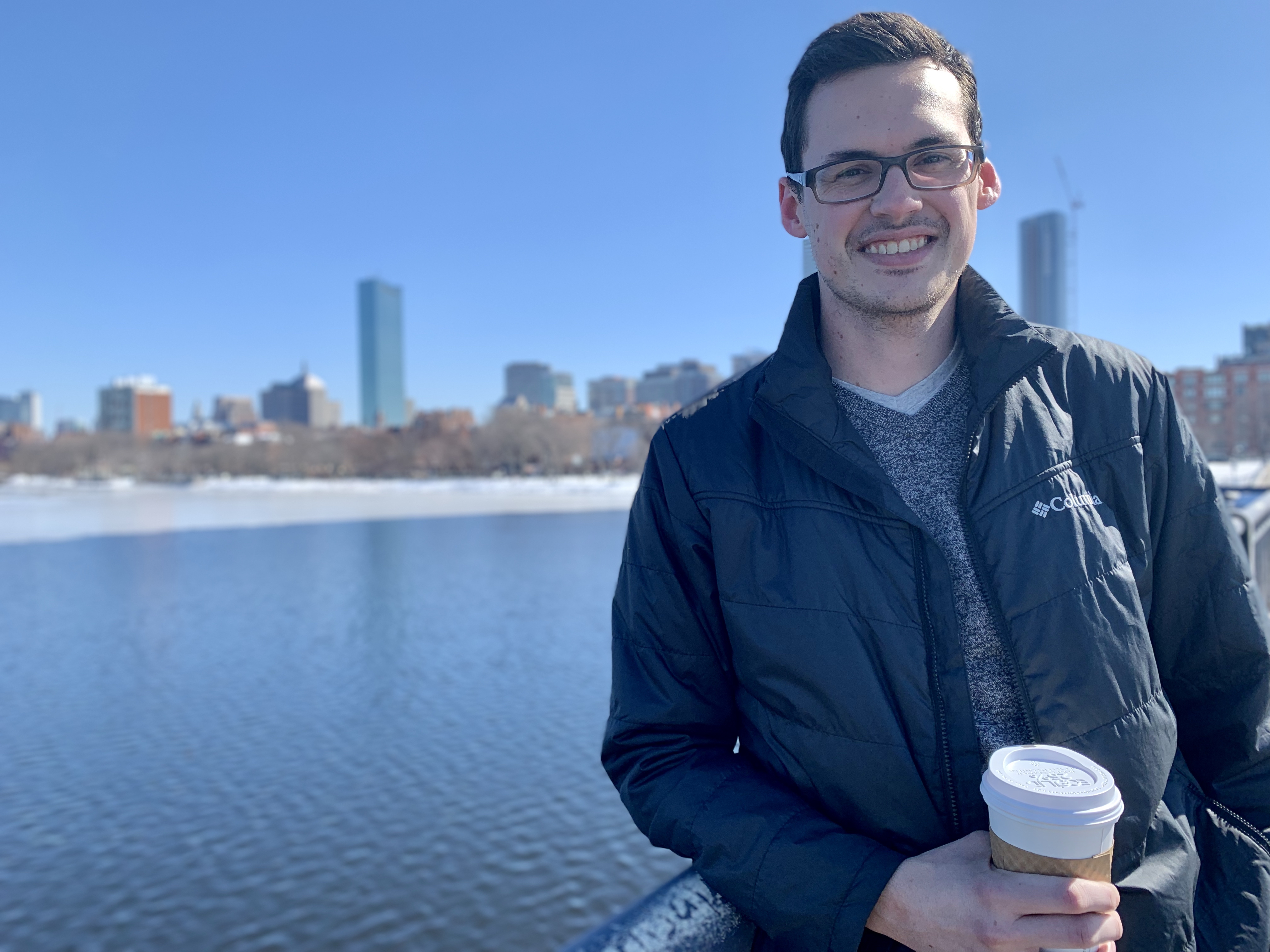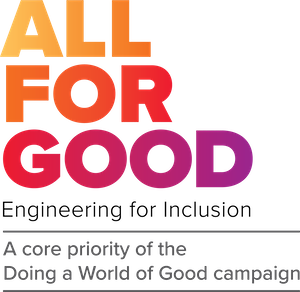
Scott (right) and his boyfriend Matt (left) on a recent trip to Orlando, FL
AIChE presents the most recent post in this series featuring LGBTQ+ engineers and their allies as part of an ongoing effort to share stories of diversity, equity, and inclusion. Other related efforts include the LGBTQ+ Inclusion in Engineering (Workshop & Panel), held at the 2019 Annual Meeting, leadership receptions for LGBTQ+ members and allies, as well as Safe Zone LGBTQ+ Ally Training workshops.
All aforementioned initiatives are supported by the AIChE Foundation's Doing a World of Good Campaign. In this installment of our series, we interviewed Scott Danielsen, who shared his story as a LGBTQ+ STEM professional working as a postdoc in a polymer and soft matter research group at Duke University.
Where did you complete your chemical engineering education?
I received my B.S.E. in Chemical and Biomolecular Engineering at the University of Pennsylvania, and my Ph.D. in Chemical Engineering at the University of California, Santa Barbara.
How many years have you been a member of AIChE?
10 years.
Tell us a bit about your job and your job responsibilities. What’s a typical day at work?
I’m currently a postdoc in a polymer and soft matter physics research group with Prof. Michael Rubinstein. As a postdoc, the bulk of my responsibilities are related to ongoing research projects, but I also assist in teaching graduate polymer courses and am involved with organizing a Soft Matter Center to coordinate and expand soft matter research at Duke.
My research is primarily the development of theories for associative or “sticky” polymer solutions and blends, such as polyelectrolyte complexes. I also conduct experiments on lung mucus in connection with the Marsico Lung Institute at the University of North Carolina Medical School.

A typical day involves research project meetings, sitting in on course lectures, attending seminars from visiting scholars, and hopefully finding a good block of time to either write or sit down with a pen and paper to work out some new ideas.
Tell us a bit about your experience as an out LGBTQ+ professional working in engineering.
As a gay man, coming out is a continuous process, a conversation that happens anytime you mention or are asked about your personal life. Perhaps ironically, these coming out moments are more anxiety producing than when I came out to myself or friends, but they are equally as important.
I have lacked any LGBT+ professional mentors, so I find it critically important to be my authentic self in the workplace and be a resource for others, to show that LGBT+ engineers exist, and they can be smart and successful.
A few years back, I gave a talk at a conference (not AIChE) about some of my graduate work, of which I was particularly excited, and the session chair downplayed my contribution, making comments about being overly dramatized (read: flamboyant). Since my speaking style is overtly “matter of fact” bordering on monotone, I knew immediately their subtext. I was disheartened personally and professionally. By increasing visibility of LGBTQ+ engineers and scientists, I hope I can help to put an end to that kind of stereotyping.
Allies can foster a more inclusive environment by simply bringing their authentic selves to work every day and recognizing the diversity of lived experiences among their colleagues.
What are the most important issues that LGBTQ+ engineers deal with in the workplace today?
Visibility and expectations are constant challenges of being an LGBTQ+ engineer. An adage was that you had to work twice as hard to be respected. While I think that still rings true sometimes, having visibility of the great breadth and depth of LGBTQ+ engineers and their various successes will go a long way in leveling the expectations.
Do you know others in the profession who struggle with being out in today's workplace?
Unfortunately, yes. I’ve known several colleagues who were closeted in both their personal and professional lives due to their fears about how it would be perceived in the workplace. Increasingly, I’ve encountered more people who are out LGBTQ+ individuals in their personal lives, but strictly not out at work.
How can people (peers who are allies, and members of management and leadership who are allies) help foster a more inclusive environment for LGBTQ+ chemical engineers?
Allies can foster a more inclusive environment by simply bringing their authentic selves to work every day and recognizing the diversity of lived experiences among their colleagues.
People in leadership positions can further be supportive by broadening and making more flexible company guidelines for paid parental leave, assistance with adoption costs, and so on to remove any institutional prejudice.
Beyond the development of computer science and tragic persecution, Turing reminds me that as scientists and engineers, we can do a great part to advance society and solve worldwide challenges in extraordinary ways.
Tell us a bit about your personal life.
I live with my significant other, Matt, in Raleigh, NC. During quarantine, we look forward to our long walks through the neighborhood, and otherwise, we enjoy spending the weekend outdoors with friends at a brewery or restaurant, or competing in our LGBTQ+ kickball league, where we met.

Are there any LGBTQ+ inspirations, role models, or moments in history that are important to you?
I take great inspiration in the life and work of mathematician Alan Turing, famous for code breaking during World War II and unfortunately, later, for his punishment for being gay. Beyond the development of computer science and tragic persecution, Turing reminds me that as scientists and engineers, we can do a great part to advance society and solve worldwide challenges in extraordinary ways.
Perhaps a more modern inspiration is the Irish Taoiseach, Leo Varadkar, who has used his visibility to reassure and inspire young LGBTQ+ people “that anything in life is possible.”
What’s your dream getaway?
My dream getaway is to travel through Scandinavia, exploring the natural beauty of the fjords and cultural experiences of the small villages and seaports. Plus, I’d love to buy some traditional Nordic baked treats that I normally must bake myself!

Gaydar: Does it exist?
Of course! Although mine is often overly optimistic, “please-be gaydar,” if you will.
Join AIChE's LGBTQ+ & Allies Online Community
This community is open to professional AIChE members who are LGBTQ+ and allies. Topics of discussion will include the ongoing development of LGBTQ+ initiatives within AIChE, plus issues concerning, and opportunities for, LGBTQ+ chemical engineering professionals.
Learn more about the community.
This initiative is supported by the AIChE Foundation's Doing a World of Good Campaign.
AIChE Foundation – All for Good Campaign

Learn more about AIChE's Diversity and Inclusion Initiatives.
Interested in helping?
Are you an LGBTQ+ chemical engineer and AIChE member interested in sharing your story to help create awareness around diversity and inclusion? Are you an LGBTQ+ ally interested in helping with diversity and inclusion efforts? Send us a note at chenected@aiche.org with the subject "Diversity and Inclusion."


